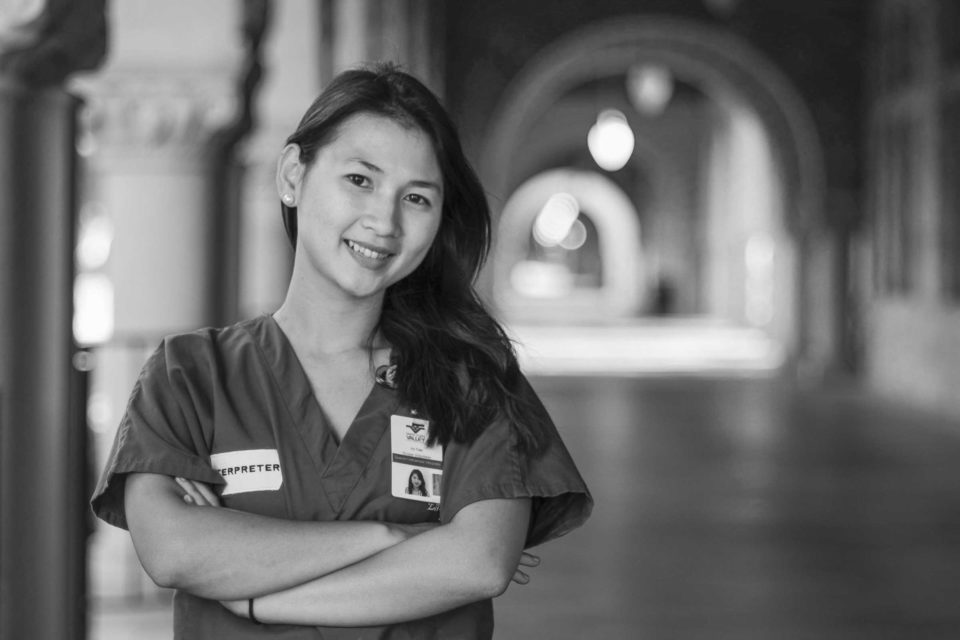Living and breathing public service at Stanford
Vy Tran, who is pursuing a co-terminal master's degree in Community Health & Prevention Research, began her public service journey at Stanford as a medical interpreter – in Vietnamese and Spanish – for patients at a nearby medical center.
Vy Tran didn’t come to Stanford planning to get involved in public service.
But looking back on the last four years, Tran realized she had subconsciously woven public service into every aspect of her student life – in the academic courses she chose, in her weekly volunteer work at a local hospital, and in the summers she spent in Mexico participating in Stanford’s Community Health in Oaxaca Program.
Tran said she was a little awestruck by the realization that public service formed the core of her Stanford experience.
“I have been living and breathing public service,” said Tran, who earned a bachelor’s degree in human biology, with honors, in June 2016.
Tran’s honors thesis, I’m over Here, Doc: Assessing the Effectiveness of Training on the Patient-Doctor-Computer Relationship, is based on a patient survey she conducted at the Santa Clara Valley Medical Center in San Jose, California, under a Stanford fellowship.
She is now pursuing a master’s degree in Community Health & Prevention Research, a program of the Stanford School of Medicine.
“I see research as a way to scale up service by advocating for certain legislation or certain populations that are unable to speak for themselves,” Tran said. “While I’m still very committed to direct service, I realized that if I wanted to scale up my impact I needed to tackle change on a systemic level.”
Tran was recently named a 2016 Newman Civic Fellow by a national coalition of colleges and universities committed to the public purposes of higher education. Stanford President John L. Hennessy recommended her for the award, which honors inspiring student leaders committed to finding solutions for challenges facing communities throughout the country.
Tran traces her public service journey on the Farm back to her freshman year, when a friend handed her a flyer for the Student Clinical Opportunities for Premedical Experience (S.C.O.P.E) program, which is affiliated with the Haas Center.
I see research as a way to scale up service by advocating for certain legislation or certain populations that are often left out in our society’s decision-making. While I’m still very committed to direct service, I realized that if I wanted to scale up my impact I needed to tackle change on a systemic level.
Vy Tran
After earning certification as a medical interpreter in Vietnamese and Spanish through S.C.O.P.E, Tran began making weekly trips – a 90-minute commute by bike and train – to the Santa Clara Valley Medical Center. She later became director of S.C.O.P.E, and under her leadership, the student-run organization dramatically increased the number of Stanford students volunteering as medical interpreters.
Tran, whose family immigrated to a Hispanic neighborhood in Atlanta from rural Vietnam when she was 10 years old, had personal reasons for becoming a medical interpreter. She missed engaging in conversations in her native language and wanted to connect with San Jose’s large Vietnamese- and Spanish-speaking communities.
“I also enjoy interacting with people from diverse walks of life – particularly learning from those who are older than I am,” she said. “I was seeking experiences outside of Stanford, and a way to connect with home. It was wonderful.”
Tran’s interest in public service is also reflected in her dedication to the Community Health in Oaxaca Program, which is part of the Bing Overseas Studies Program at Stanford.
She devoted two college summers to the program, which combines classroom study and discussion with cultural immersion, language training, clinical rotations and community service in Oaxaca, an impoverished state in southern Mexico. During the second summer, she served as a course assistant for the program, which is led by Dr. Gabriel Garcia, a professor of medicine at Stanford School of Medicine.
In August, Tran is returning to Oaxaca to serve as a community health researcher with Niño-a-Niño (Child to Child), a grassroots organization that teaches nutrition, health, and environmental awareness to people living in small villages.
She received grants from the Fulbright U.S. Student Program and the Dalai Lama Fellows to help Niño-a-Niño evaluate its youth empowerment program. The goal of the research is to understand the experience of youth – teenagers and young adults – in the program, to explore the role they play in the well-being of the community and to identify opportunities for improving the program.
The research will form the basis of Tran’s master’s thesis, which she plans to complete at Stanford next spring.
Tran said public service is one of the best investments a student can make at Stanford.
“I’ve learned so much more from public service than I can ever give back,” she said. “I would not be who I am today without my public service experiences paving the way.”

